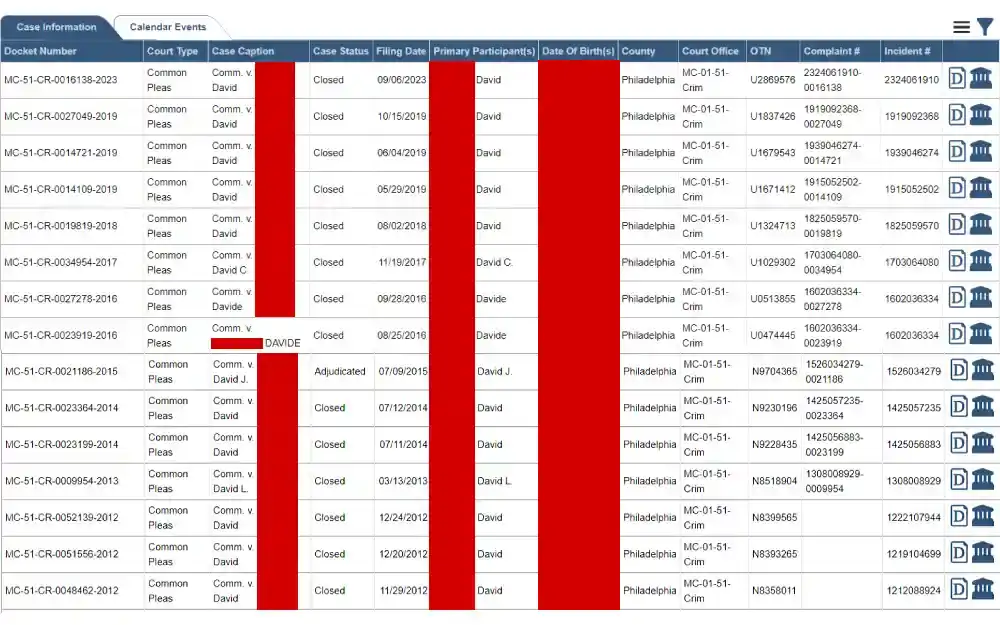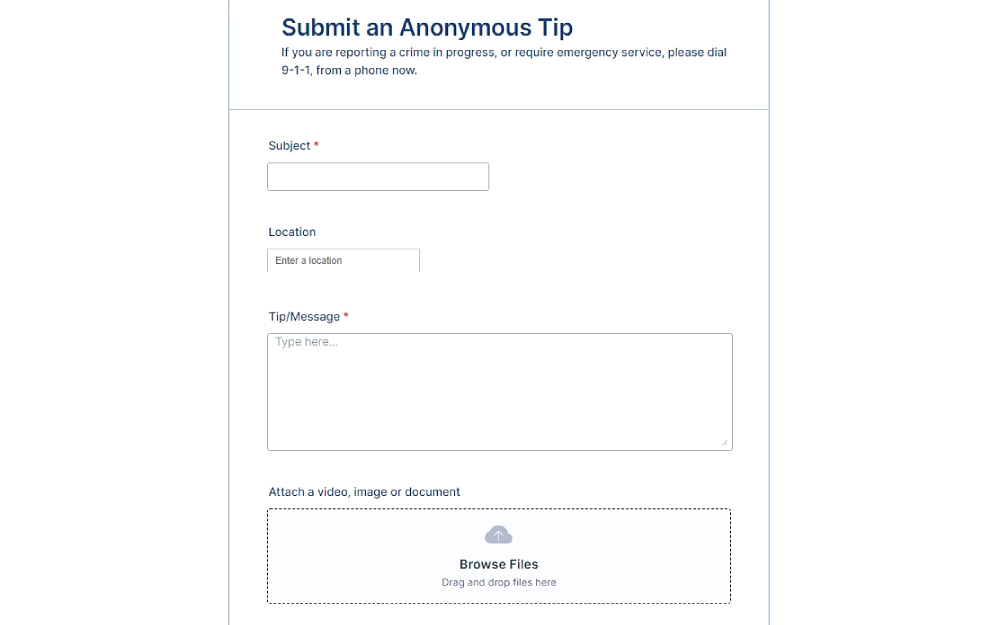Perform a free Philadelphia County warrant search today.
Warrants, among other government-produced documents, are considered public records under Pennsylvania’s Right to Know Law. You can conduct a search to check on someone else or to see if you have any outstanding warrants.
In fact, you can conduct a warrant search for any reason you want. While there is no standard way in which government agencies must make these records available, this resource will answer your questions about warrants and how to search for them. Read on to learn how to efficiently check for warrant information throughout Philadelphia County.
This resource was written by Attorney Robert Bailey Jr, who holds a Juris Doctorate from Widener University School of Law.
Tracking Down Free Warrant Information in Philadelphia County (an Overview)
If you want to track down warrant information in Philadelphia County, there are some basics you ought to know first. The below overview will help you understand when warrant information may be restricted, where to look for it and the type of information you need to conduct an effective search. This information will make the process much smoother when you go to perform your warrant search in Philadelphia County.
One thing you should be aware of upfront is that while you may have broad access, not all warrant information is available. Under the Pennsylvania Right to Know Law, while there is a presumption of openness, there are certain restrictions on warrants.1 Most notably, there is a restriction when the release of warrant information may interfere with an ongoing law enforcement investigation.
There are several types of warrants (you will learn more about this later), and some of them are more prone to exemption than others. For instance, arrest warrants are broadly available.
However, those involving searches tend to be restricted. The reason is that the release of a search warrant before being fully executed would give a criminal the opportunity to remove evidence of a crime.
When it comes time to conduct a warrant search, available records can be found through various means. Sometimes, you may want to submit a formal request for records by email or mail. However, most people start with an informal search, which can be done with online databases, in-person searches, or by calling the record custodian on the phone.
You will need to make sure you have the necessary information to conduct a warrant search. While different options may require unique information, almost all options will request that you provide the full name of the person and where they live (address or at least the county). In addition, knowing the county that issued the warrant is essential to make sure you search with the correct government agency.
Additional information can help speed up your search. Consider gathering any information you have on the person, such as their physical characteristics and other identifying information. Also, if you have any details about the warrant (e.g., when and why it was issued), that will be helpful as well.
Each county has its own record custodian, and they can vary from one location to the next. There can also be multiple record custodians in the same county. In Philadelphia County, the records custodian for warrant information is the Court of Common Pleas within the First Judicial District of Pennsylvania.2
Most counties are made up of several cities and towns which have their own local municipal government. Sometimes, these local government agencies issue their own warrants. However, Philadelphia County is co-extensive with the city of the same name, and there is no separate option for locating municipal warrant information.
How To Conduct a Philadelphia County Warrant Search for Free
If you are looking for warrant information in Philadelphia County, your best option for accessing this data is by searching criminal case records through the First Judicial District of Pennsylvania. One option is to look for criminal cases with warrant information through the Unified Judicial System Case Search Tool for Pennsylvania.3
To use this tool, you can elect to search by the person’s name, criminal complaint number, attorney’s name, and more. When performing a search, since this is a unified tool, you will first need to select Philadelphia from the County drop-down menu. Next, you will want to select “criminal” for the docket type.

After you have set these parameters, you can enter the person’s name. If you want, you can set a filing date range or select the case status. Once you run your search, the results will provide you with the person’s name, docket number, filing date and case status.

There is also additional information that may be helpful if you have to contact a different government agency, such as the complaint and incident number.
There is an option to select either the docket sheet or court summary to obtain additional information where you will be able to find warrant data.
The docket entries contain a chronological listing of all court events. This is a likely location to find warrant information. You can also just perform a “Ctrl-F” search for warrants with either of these documents.
The Court of Common Pleas (part of the 1st Judicial District of Pennsylvania) has primary jurisdiction over criminal cases in Philadelphia. To search for warrant information via their criminal records, you can contact their Criminal Division by email at [email protected] or by phone at 215-683-7004.4 You can also go in person to the address below:
Court of Common Pleas of Philadelphia County
1301 Filbert St., Rm. 203
Philadelphia, Pennsylvania 19107
They are open Monday through Friday from 9:00 AM to 5:00 PM.
For additional information, you can also contact the First Judicial District of Pennsylvania by email or by calling them at 215-686-7000. They are available Monday through Friday from 8:00 AM to 5:00 PM. You can also go in person to talk to someone at the following location:
First Judicial District of Pennsylvania
City Hall
Philadelphia, Pennsylvania 19107
You can also contact the Philadelphia Sheriff’s Office for warrant information. You can contact their warrant unit at 215-686-3574 or by going to the address below:
Philadelphia Sheriff’s Office
100 S. Broad St., 5th Fl.
Philadelphia, PA 19102
You can also check for warrant information with the Philadelphia Sheriff’s Office Top Priority List.5

How To Check for Warrants Throughout Pennsylvania
During your search you may have a need to expand your search. This could be because you were unable to locate a particular warrant record. Or, you may want to expand your search to see if a person has warrants in other counties in Pennsylvania.
To search for warrant information throughout the state, you can use the Unified Judicial System Case Search Tool for Pennsylvania. This is the same tool that was used to search for warrant information in criminal cases processed in Philadelphia County.
The only difference in using this tool for a statewide search is to make sure you do not select a particular county. This will allow you to search the database for every county in Pennsylvania at once.
If you need additional information, you will have to reach out to the Clerk’s Office of the particular court that handled the criminal case and warrant.
What Types of Warrants Are There & What Does Each Mean?
There are multiple types of warrants in Philadelphia County. Knowing which types of warrants you may encounter can help guide your search. It can also be a great resource when reviewing any warrant information you locate.
The types of warrants you may encounter when conducting a search in Philadelphia are listed below.
Arrest Warrant: This warrant gives law enforcement the authority to take a person into custody for the likely commission of a crime. It is issued when enough evidence is presented to a judge that there is probable cause that the particular person committed a specific crime.
Probation & Parole Warrant: This is a specific type of arrest warrant that is issued when a person violates a condition of their probation or parole.
Child Support Warrant: If a person is significantly delinquent on court-ordered child support payments, a warrant can be issued for this inaction.
Fugitive Warrant: This type of warrant is issued for a person’s arrest when they have committed a crime and fled the jurisdiction where it occurred.
Bench Warrant: The bench warrant is issued by a judge based on an individual’s failure to abide by a court order. This most often occurs when a defendant in a criminal matter fails to show up for a required court hearing.
Search Warrant: This warrant is given at the request of law enforcement when they can provide a judge with probable cause that there is evidence of a particular crime at a specific location.
Capias Pro Fine Warrant: This is a unique type of warrant that can even be issued in civil cases where a defendant has a judgment against them and refuses or fails to pay the court-ordered restitution.
Note: If you see the term “active” in your warrant search, it means that it has not been fully executed or resolved.
How To Settle an Active Warrants in Philadelphia County
After you have conducted your search, you may be shocked to discover that there is an outstanding warrant for your arrest or someone you know. While it is not time to panic, you should carefully consider your next steps.
You Have a Warrant: If you find out that you have an outstanding warrant, read the information carefully. For certain minor issues, a warrant may be resolved by reaching out to the court that issued it.
You may have the opportunity to have the warrant quashed by submitting a payment for an overdue fine or restitution. Or you might just have to reschedule a hearing you forgot about.
However, the warrant may be serious enough to require you to turn yourself in with the Philadelphia Sheriff’s Office.6 In this situation, you will want to contact a licensed attorney who handles Philadelphia criminal cases. They will be able to answer any of your questions and walk you through the next steps you need to take.
In addition to contacting an attorney, you will also want to call a reputable bail bondsman. They can assist you in preparing for the option to post bail after you are processed. You also want to make sure that you let any family members know who may be concerned about where you are.
Someone You Know Has a Warrant: If you find out a friend or a family member has a warrant for their arrest, you should privately let them know in case they are unaware of the situation. You may feel uncomfortable, but they will thank you later if it helps them get it resolved. If you do not have a good relationship with them, you could let a mutual party pass along the warrant information.
If the warrant is for a violent or for a serious felony, you should provide local law enforcement with any information you have about the person’s whereabouts. You could submit a tip to the Philadelphia Police Department by calling them at 215-686-8477 or sending an email to [email protected].7

You now know what to do with any information you find when conducting a Philadelphia County warrant search; use the valuable information you find with these search tools responsibly.
References
1Office of Open Records. (2021, January 08). RTKL Citizens’ Guide. Retrieved February 14, 2024, from <https://www.openrecords.pa.gov/RTKL/CitizensGuide.cfm>
2The Philadelphia Courts – First Judicial District of Pennsylvania. (n.d). Search Municipal Court – Criminal Division New Criminal Filings. Retrieved February 14, 2024, from <https://www.courts.phila.gov/NewCriminalFilings/>
3The Unified Judicial System of Pennsylvania. (n.d). Case Search. Retrieved February 14, 2024, from <https://ujsportal.pacourts.us/CaseSearch>
4The Philadelphia Courts – First Judicial District of Pennsylvania. (n.d). Court of Common Pleas Trial Division – Criminal. Retrieved February 14, 2024, from <https://www.courts.phila.gov/common-pleas/trial/criminal/>
5Philadelphia Sheriff’s Office. (n.d). Top Priority List. Retrieved February 14, 2024, from <https://phillysheriff.com/top-priority-list/>
6Philadelphia Sheriff’s Office. (n.d). About Us. Retrieved February 14, 2024, from <https://phillysheriff.com/about-us/>
7Philadelphia Police Department. (n.d). Forms & Reports. Retrieved February 14, 2024, from <https://www.phillypolice.com/forms/tips>
8Philadelphia Police Department. (n.d). Submit an Anonymous Tip. Retrieved February 14, 2024, from <https://www.phillypolice.com/forms/submit-a-tip>
